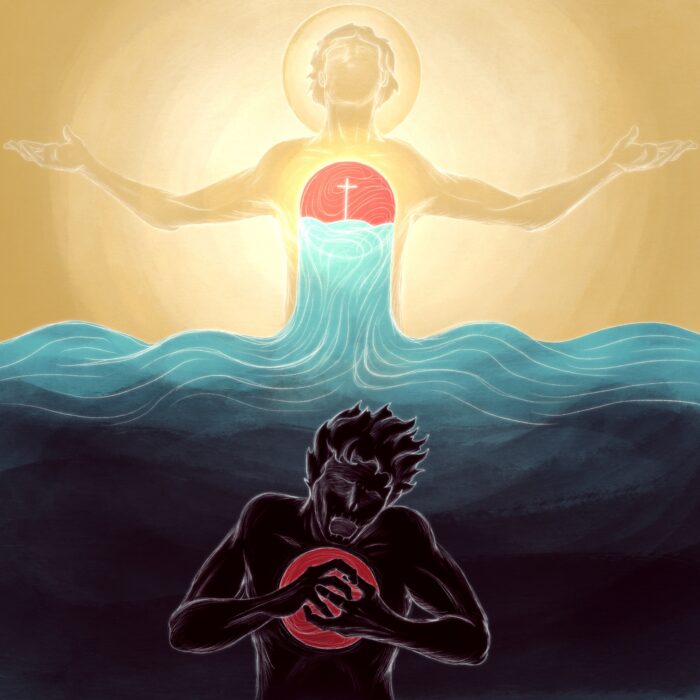Matthew 25:40 + Luke 9:46-48


Matthew 25:40, “The King will reply, ‘Truly I tell you, whatever you did for one of the least of these brothers and sisters of mine, you did for me.'”
For today’s picture, the text I put together with the image is actually not the text that gave me the idea for the image….the passage that origianlly sparked the idea for this theme was Luke 9:46-48. You can read that passage and my thoughts on it (from a recent journal entry) below:
“An argument arose among them as to which of them was the greatest. But Jesus, knowing the reasoning of their hearts, took a child and put him by His side and said to them, Whoever receives this child in my name receives me, and whoever receives me receives Him who sent me. For he who is least among you all is the one who is great.”
– Luke 9:46-48
What measure of greatness were the disciples using in their argument? I think it may have been regarding which of them was closest to Jesus, which of them knew Him best, which of them was most privileged in His counsels, etc. This argument may well have started because Jesus took Peter, James, and John with Him up the mountain and they saw His glory in a way that the other disciples had not. Their apparent “inside track” with the Master may have been the impetus for the argument.
I say that not merely out of speculation, but because of how Jesus responds. In verse 47 we’re told that He knew the reasoning of their hearts. That is to say, not simply did He recognize what they were arguing about, but He understood why and how they were arguing about it. He discerned the underlying issue. And, as a way of addressing the root of their argument, He takes a child and places him by His own side and says that whoever receives this child in His name receives Him, and—ultimately therefore—receives God the Father who sent the Son. The ground for this all is that the one who is least among them is greatest.
So, it seems to me that the disciples were arguing over which of them was closest to Jesus, which of them knew Him best etc., and in response, Jesus takes one who is completely on the fringes, one who is wholly overlooked, one who seems not even to be in the field of consideration for their discussion, and takes this one to His side. And then He says, essentially, if someone truly wants to be close to Him….if someone truly wants to know Him and be in His intimate fellowship, then they are to receive “the least among you” in the name of Christ, and in so doing will receive Christ Himself—and even more, they will receive the Father who sent Christ.
And what is it to “receive” one of the least of these? The word seems to imply—at least in situations regarding interpersonal relations—a rich, glad-hearted welcome in. How do we “welcome Christ in” and so welcome in God the Father? How do we share this depth of intimacy with the Lord? It is in/as/when we welcome in those who are forgotten, downtrodden, weak, helpless, and of no estimation in the world’s eyes. Who is the one closest to Jesus (if I am correct in my assumptions about the grounds for their argument)? It is the one who welcomes in the weak and forgotten and “least of these.”
And lastly, notice that Jesus says this is so “for he who is least among you all is the one who is great.” What is the greatness of the least of these? Why is it that simply being “least among you all” makes one “great”? Well, if I am correct in assuming that the greatness that the disciples were arguing about was closeness to Christ, then the answer seems to be that Christ is with the least of these.
In His incarnate person while He was on the earth and by His all-pervading presence and Spirit while He is ascended to heaven, God the Son—the radiance and glory of the Father—is with the weak and poor and powerless and suffering in a unique way, in a way—it would seem—that He is not with the “great ones” of the world.
And perhaps even more than this, we remember that Christ Himself became the least of all when He bore the sin, suffering, and final abandonment of His people….he became the utterly and infinitely outcast one…in His death, the greatest became the least, and so forever invested “leastness” with His own “greatness.”
For these reasons, the least among us are the ones who are “great” with the greatness that the disciples were seeking because the least among us are the ones to whom Christ is near in a unique way.
And if we would share this greatness, it will be as we welcome, as we receive, as we minister to the weak ones in the name of Christ (That is key to note, if we minister to the poor in some other name, for the exaltation of some other god, then it would seem that there is no communion with Christ to be had).



